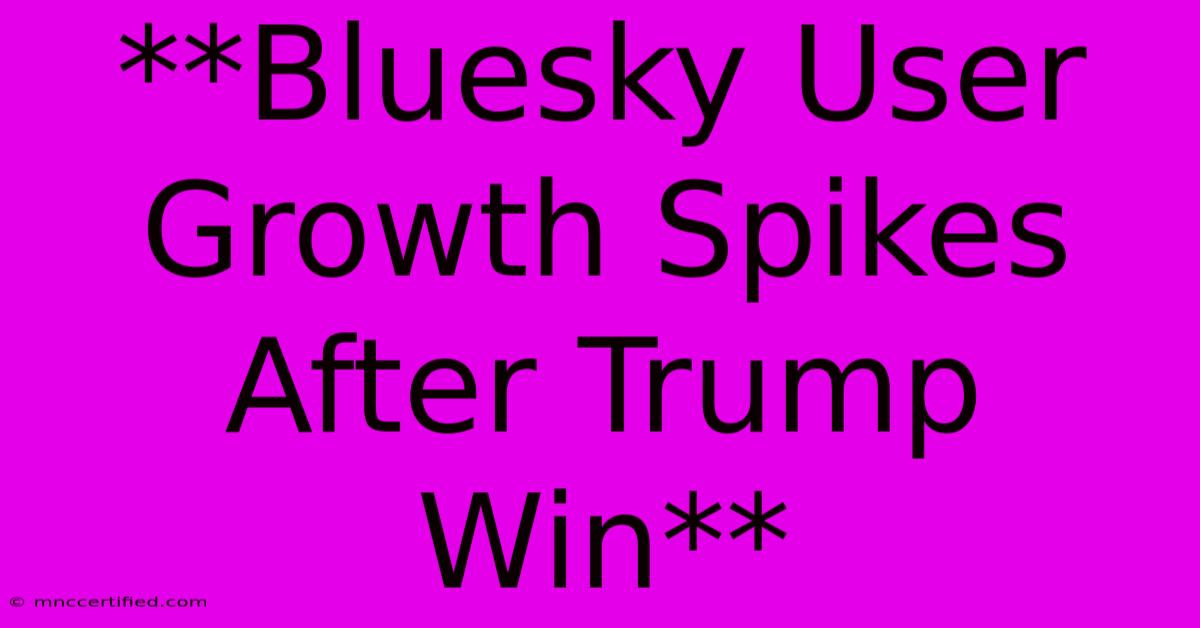**Bluesky User Growth Spikes After Trump Win**

Table of Contents
Bluesky User Growth Spikes After Trump Win: A New Home for the Disenfranchised?
The recent surge in user sign-ups for Bluesky, a decentralized social media platform still in beta, has sparked widespread speculation about its potential as a viable alternative to Twitter. The timing of this growth spurt is particularly intriguing, coinciding with Donald Trump's triumphant return to the platform after a two-year suspension. While the exact reasons behind this surge are complex and multi-faceted, it's clear that Bluesky's promise of a less-controlled, more transparent online space is resonating with users seeking a departure from the established social media landscape.
A New Era of Free Speech?
Bluesky's core philosophy revolves around decentralization, allowing users to control their data and interactions within a network free from the influence of a single entity. This decentralized approach has been touted as a solution to the perceived censorship and manipulation that plague many social media platforms. The potential for greater freedom of expression is particularly attractive to those who feel silenced or marginalized on existing platforms.
Trump's return to Twitter, followed by a wave of suspensions and bans for other accounts, has undoubtedly fueled this desire for a more open environment. While the exact details of Bluesky's moderation policies remain unclear, the promise of a platform governed by user-defined rules rather than centralized algorithms has ignited a wave of interest among those disillusioned by the perceived biases and censorship of established platforms.
Beyond the Hype: Is Bluesky the Answer?
Despite the buzz surrounding Bluesky, it's crucial to approach this potential shift with a degree of caution. While the platform's vision is compelling, its current status as a beta platform raises questions about its long-term viability. The platform still faces significant challenges in terms of user experience, scalability, and security.
Moreover, the promise of a "free speech" utopia is a complex one. Decentralization inherently introduces new challenges in terms of content moderation and accountability. Balancing the freedom of expression with the need to protect users from harmful content will be a critical issue for Bluesky as it navigates its growth and development.
The Future of Online Communication: Decentralization or Regulation?
The recent events surrounding Bluesky and Trump's return to Twitter highlight a broader shift in the landscape of online communication. The rise of decentralized platforms represents a challenge to the established social media giants and their centralized control. This trend suggests a growing demand for alternative spaces that prioritize user agency, transparency, and a more equitable distribution of power.
Whether Bluesky ultimately becomes a viable alternative to Twitter remains to be seen. However, its recent surge in user growth reflects a growing desire for platforms that prioritize user autonomy and challenge the existing power structures of social media.
As the online world evolves, the question of how to balance freedom of expression with the need for moderation and accountability will continue to be a central debate. The success of decentralized platforms like Bluesky may depend on their ability to navigate this complex landscape and offer a truly empowering alternative to existing social media giants.

Thank you for visiting our website wich cover about **Bluesky User Growth Spikes After Trump Win**. We hope the information provided has been useful to you. Feel free to contact us if you have any questions or need further assistance. See you next time and dont miss to bookmark.
Featured Posts
-
Duke Coachs Concern Over Flaggs Health
Nov 13, 2024
-
Budget Travel City 2 5 Hours From Uk Pints Under 2
Nov 13, 2024
-
Noem Nominated For Homeland Security By Trump
Nov 13, 2024
-
Are Stairlifts Covered By Insurance
Nov 13, 2024
-
Kevin Love Backs Singler After Strong Game
Nov 13, 2024